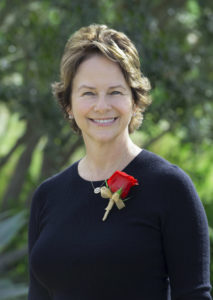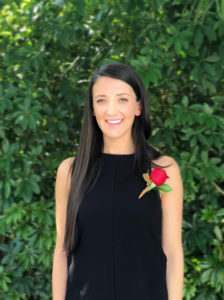First in a series

By Donald H. Harrison

SAN DIEGO – They are of different generations and live on different coasts of the United States, but one can’t help but think of Marsha Berkson and Estee Einhorn as close colleagues who helped to establish Jewish Family Service’s Hand Up Pantry, which offers hungry and homeless people not only free food but also plentiful helpings of dignity. Both Berkson and Einhorn are among eight women who will be honored at the annual JFS “Heart and Soul Gala on April 21 in this, JFS’s centennial year.
Berkson, as a parent, helped to organize such programs at San Diego Jewish Academy as a mentoring school arrangement with an underperforming elementary school, assembling wheelchairs for disabled persons in Mexico, and a massive relief drive for the victims of Hurricane Katrina, which resulted in the filling of an entire cargo plane with supplies. After Jill Borg Spitzer, then the JFS executive director, contacted her during a fundraising drive preparatory to building the agency’s modern campus on Balboa Avenue, Berkson expressed particular interest in the pantry, which would provide food for the needy.
Approximately in 2005, “I met Jill at the little office in Hillcrest and she rolls out the blueprints,” Berkson recalled. After looking at the plans for an 800-square-foot pantry within the JFS complex, Berkson asked “Did you ever think of having it run by teens and have them organize the food drives and pack the shelves and distribute the food to those in need?”
Spitzer thought about it and urged Berkson to put her ideas down on paper. Berkson did, and Spitzer “assigned staff to assist me because if you only rely on lay leadership, eventually they will move on,” Berkson said. “She gave me a few staff people and I would meet with them every week. What I did initially is that I called all of my friends who had kids in middle school or freshmen in high school and I invited them over for breakfast. There were about 25 women, and I proposed to them what I was going to do, and they all said, ‘Sign my kid up.’ So, I had buy-in from their parents, and the kids were invited to bring their friends, and we had probably 75 kids come to the first meeting. Craig Parks [a youth leader, who has worked with synagogues and Jewish organizations] came in to help me motivate them, get them inspired, and he has such a gift for working with teams. We broke into groups, had brainstorming sessions, and named it Hand Up.”

Einhorn, who today works as a mixed-use real estate developer in Washington, D.C., was among the teens who attended those brainstorming sessions.
She recalled that “we sat in a room for hours, coming up with different ways that we could give help. We really wanted to come up with a way to help people help themselves, not just be a food bank giving handouts. We wanted to do the opposite, give them a hand up—to help them help themselves. So, over time we started a little closet at JFS where we would be delivering cans of food from our homes and also hosted drives at the Jewish Academy and other schools in San Diego.”
Berkson said that in developing the Hand Up concept, the group met with homeless people to ask for their input. What do they need? She recalled that one man told them not to distribute Granola Bars because they are too hard, and “we have bad teeth.”
Einhorn said it was decided that the Hand Up experience should differ from standard food distribution projects where people line up to be given sacks of food. “It was set up like a market,” in which clients could walk down the aisles and fill their baskets with the foods that they wanted. Compared to distribution lines, the Hand Up Pantry was and is “a much more humane experience and a fun experience,” she added.
The pantry took its programs on the road, setting up monthly distributions at Camp Pendleton Marine Corps Base, and at Murphy Canyon Military Housing in San Diego. Tables were set up with various food items to choose from, while nearby the clients’ children were invited to romp on a playground or to participate in arts and crafts projects. A resource person from JFS also was there, ready to make suggestions to people in need about what they could do to qualify for Food Stamps, or who to contact about a Social Security problem.
“We were working with people who in many cases were above the line for Food Stamps, but just above, so they were still struggling to make ends meet and especially to put healthy food on the table. So, we assessed a person’s situation, saw their income level, and laid all this out for them.”
The teen volunteers were also beneficiaries of the program, Berkson commented. “We wanted to give them leadership skills,” she said. “Before we would start the year, we used to have a retreat, taught them about public speaking, writing agendas, how to motivate and organize food drives. It was about them leading and then taking the initiative themselves. I can’t tell you how many times these kids subsequently have come up to me and told me about what projects they have initiated at their colleges, so the program definitely ignited the leadership side of them, and that is what my hope always has been.”
Remembering back to her high school years, Einhorn said Hand Up was “a really rewarding experience for everyone, and every one of those experiences made me want to help more. In the time when you are a teenager, you can be at a very selfish point in your life where all you think about is yourself and it is hard to see the bigger picture. This really helped me to step outside of myself and to understand how lucky I am and how much I could help. And so, it was a really important thing to be part of at such a critical point in my life.”
Dealing with military families was not at all like what she had expected. “It really shocked me, to be honest, that people who were serving our country, with a member of their family in the active military, were struggling to make ends meet,” she said. “That is something that most people don’t know. It was extremely eye-opening to us that food insecurity has no specific face. It can affect anyone.”
As a teen leader with Hand Up, Einhorn coordinated a food drive at the San Diego Jewish Academy. She traveled with other students to Sacramento to lobby in behalf of hunger issues. She was part of a successful effort to persuade U.S. Rep. Susan Davis (D-San Diego) to introduce legislation eliminating occupancy of military housing as a factor in determining financial eligibility for Food Stamps. She also volunteered at seven or more distributions at military installations.
At distributions for the hungry, she added, “I was shocked, how normal these people seemed. Everyone I met I felt was someone I could have gone to school with, or been the parents of one of my friends. I never would have known that they were hungry. We had meaningful interactions when we spoke on a human level, rather than as helper and helpee. It was one-to-one, face-to face, and we were all on the same level. The only distinction was that the volunteers were wearing Hand Up T-shirts. It is a very dignified interaction, more of a social place than it was a food bank.”
Both Berkson and Einhorn have gone on to other pursuits. Berkson, besides being a donor and a board member of JFS, today is a consultant helping JFS directors, managers, and supervisors to recognize their combination of strengths and those of others, and based on that recognition, to build team work.
As a certified Gallup Strength Coach, Berkson has clients, including JFS personnel, answer 177 questions, spending no more than 20 seconds per question, to determine their strengths, based on what they do naturally. After the questionnaires are assessed, participants are likely to fall within 34 different talent groups. For example, she said, some may be good at execution, being list makers, arrangers, and people who are good with systems and tools. Others may be influencers, people who encourage their teams to get things done, or move projects forward. Still others may be people who are good at building relationships and are empathetic. Other people may excel at creative and strategic thinking. “So,” said Berkson, “if someone is good at relationships, but not at executing, we need them, because if they are great with people, perhaps some one else who is strong in executing can help them meet deadlines.” Together, utilizing each of their strengths, the team grows stronger.
While attending high school, Einhorn was chosen for the Aaron Price Fellowship, a program that takes a small group of students from schools across the county into the halls of government and business, seeing and experiencing from behind the scenes what makes these enterprises tick. Because the students in the program come from different socio-economic brackets, and backgrounds, this experience, like Hand Up Pantry, can broaden participants’ world views.
“Growing up in La Jolla, it was so easy to be sheltered from what is going on in the rest of San Diego and the world,” Einhorn said. “You can live in a bubble if you choose to and it was so huge to open my eyes and feel like I was part of the world. There were so many people in the Aaron Price Fellowship who were so different from me—I almost felt that I was ashamed of some of the bubble aspects of my life. I wanted to rid myself of them as much as possible. I understood there are so many people less fortunate and it is all about making an even playing field for everyone.”
As an urban developer, Einhorn utilizes some of the lessons she learned at Hand Up and at the Price Fellowship. “You look at potential opportunities, respond to requests for proposals for underutilized land, and you try to determine what can help the community, make sense financially, and take the neighborhood to the next level,” she said. This involves taking a survey of the neighborhood and “understanding what the needs are – whether it be more food options, more healthy food options.”
Berkson and Einhorn will be joined at the “Heart and Soul” Gala by six other honorees in what has been described as a “salute to JFS women.” The other honorees are Jenny Daniel, Inge Feinswog, Kira Finkenberg, Evelyn Rady, Lois Richmond, and Jill Spitzer. Stories about some of these women will be told later in this series of articles.
*
Harrison is editor of San Diego Jewish World. He may be contacted via donald.harrison@sdjewishworld.com
Pingback: Hand Up Pantry pioneers among JFS gala honorees – Marsha Friend-Berkson Consulting
Pingback: Heartfelt moments prompt volunteers for JFS | San Diego Jewish World
Pingback: JFS, looking back a century, recalls Rose Neumann | San Diego Jewish World